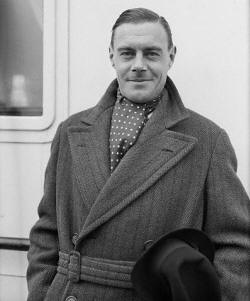

Queer Places:
Chapel Of The Pines Crematory
Los Angeles, Los Angeles County, California, USA
 Colin Clive (born Colin Glenn Clive-Greig; 20 January 1900 – 25 June 1937) was a British stage and screen actor. His most memorable role was Henry Frankenstein, the creator of the monster, in the 1931 film Frankenstein and its 1935 sequel, Bride of Frankenstein.
One of the most striking
features of Journey’s End is the intimacy in the relationships of its male
characters. Though homosexuality is not explicit in Journey’s End, the intense
relationships of the soldiers in the trenches sometimes bring to the surface
deeper feelings. Stanhope, an alcoholic, has spent three traumatic years at
the Front. He is suffering from stress and looks to the older, calmer Osborne,
affectionately known as ‘Uncle’, for advice, comfort and reassurance. The male
bonding or homosocial relationship between Stanhope and his beloved ‘Uncle’
continues to develop throughout the drama. The role of Stanhope was perfectly
suited to Colin Clive, who had played the role on stage before being cast in
the film. Clive had attended the Royal Military Academy Sandhurst, but a knee
injury disqualified him from military service. He was a complex and confused
man whose alcoholism had been caused partly by his inability to come to terms
with his homosexuality.
Colin Clive (born Colin Glenn Clive-Greig; 20 January 1900 – 25 June 1937) was a British stage and screen actor. His most memorable role was Henry Frankenstein, the creator of the monster, in the 1931 film Frankenstein and its 1935 sequel, Bride of Frankenstein.
One of the most striking
features of Journey’s End is the intimacy in the relationships of its male
characters. Though homosexuality is not explicit in Journey’s End, the intense
relationships of the soldiers in the trenches sometimes bring to the surface
deeper feelings. Stanhope, an alcoholic, has spent three traumatic years at
the Front. He is suffering from stress and looks to the older, calmer Osborne,
affectionately known as ‘Uncle’, for advice, comfort and reassurance. The male
bonding or homosocial relationship between Stanhope and his beloved ‘Uncle’
continues to develop throughout the drama. The role of Stanhope was perfectly
suited to Colin Clive, who had played the role on stage before being cast in
the film. Clive had attended the Royal Military Academy Sandhurst, but a knee
injury disqualified him from military service. He was a complex and confused
man whose alcoholism had been caused partly by his inability to come to terms
with his homosexuality.
Clive was born in Saint-Malo, France, to an English colonel, Colin Philip Greig Clive, and Caroline Margaret Lugard. He attended Stonyhurst College and subsequently Royal Military Academy Sandhurst, where an injured knee disqualified him from military service and contributed to his becoming a stage actor.[1] He was a member of the Hull Repertory Theatre Company for three years.[1] Clive created the role of Steve Baker, the white husband of racially mixed Julie LaVerne, in the first London production of Show Boat; the production featured Cedric Hardwicke and Paul Robeson. Clive first worked with James Whale in the Savoy Theatre production of Journey's End and subsequently joined the British community in Hollywood, repeating his stage role in the film version.[2]
Clive's first screen role, in Journey's End (1930), was also directed by James Whale. Clive played the tormented alcoholic Captain Stanhope, a character that (much like Clive's other roles) mirrored his personal life. He was an in-demand leading man for a number of major film actresses of the era, including Katharine Hepburn, Bette Davis, Corinne Griffith and Jean Arthur. He starred as Edward Rochester in the 1934 adaptation of Jane Eyre opposite Virginia Bruce. He was a descendant of Clive of India and appeared in a featured role in a film biography of his ancestor in 1935.[3][2]
Clive was rumored to be bisexual.[4] He married Jeanne de Casalis in June 1929, though they were estranged for several years before his death.
Colin Clive suffered from severe chronic alcoholism and died from complications of tuberculosis in 1937 at age 37.[3] Clive's alcoholism was apparent to his co-stars, as he was often seen napping on set and sometimes was so intoxicated that he had to be held upright for over-the-shoulder shots. Clive was tormented by the medical threat of amputating his long-damaged leg.[5] Forrest J Ackerman recalled visiting Clive's body: "I actually saw him in death, lying in a bed at a mortuary where it was possible for the public to view his body. He looked remarkably as he had when lying in bed in The Bride of Frankenstein."[6] Over 300 mourners turned out. One of the pallbearers was Peter Lorre.[5] His cenotaph is located at Chapel of the Pines Crematory.
My published books: